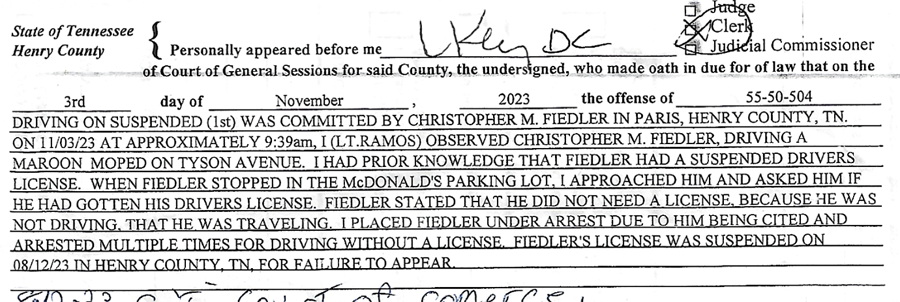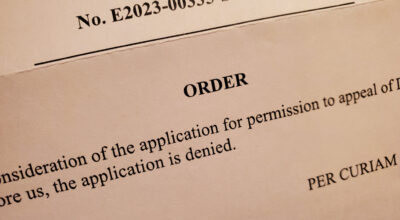
The Henry County, Tenn., jail, top photo, houses a free-spirited American named Chris Fiedler prosecuted for not having asked permission to use the public roads in a small Tennessee town. J. Neil Thompson, left, is district attorney for Henry County, in which Paris cops such as these, right photo, have repeatedly arrested Mr. Fiedler. (Photos Henry County sheriff’s office, DA’s office, Paris police department)

Chris Fiedler puts police on notice about his status as using his scooter outside the regulated area of state privilege. (Photos Nicole Beale)

This is narrative from one of six earlier arrests of Christopher Fiedler.
A man who exercises his right to travel is crammed into a jail cell the past month on a “NO BOND” in a small Tennessee town where cop Mike Ramos and others have repeatedly arrested and seized him for using a scooter without a driver license.
By David Tulis / NoogaRadio Network
Christopher Michael Fiedler is in Henry County jail in Paris, seat of Henry County between Nashville and Memphis. The restaurant cook moves about on a scooter that says “PRIVATE” in black letters on a white metal plate over the rear tire.
Officer Ramos arrested Mr. Fiedler, who requested right to indictment that the county grand jury, led by judge-named foreman Kenneth Fry, granted March 3. His arraignment in the “operating a vehicle without a license” case was set March 1. But he made no appearance and in case no. 40CC-12024-CR-17012 Mr. Fiedler was ordered arrested, a capias bench warrant inked by deputy court clerk under clerk Mike Wilson.
On the line for bond amount, it states: “HOLD WITHOUT BOND UPON ARREST” until the “next court date” May 2 at 9 a.m. In Tennessee only murder suspects may be held without bond.
The grand jury members, officer Ramos and prosecutor Neil Thompson are united in seeing the driver license and registration tag on a conveyance as absolutely required for all use of the road, even if the movement is not privileged. The indictment, though bare bones, alleges a key essential element in any charge of a crime — mens rea, or evil intent. It says Mr. Fiedler “did knowingly or intentionally” use his bike, or “operate” it “while not being in possession of a valid operator’s or chauffeur’s license,” thereby “committing the offense of OPERATING A VEHICLE WITHOUT A LICENSE” in breach of two laws. The second essential element to be alleged for the instrument to be sufficient is privileged activity, namely commerce — the hauling of goods or people (passengers) for hire in private profit and gain. This element is not alleged.

Officers of the Paris, Tenn., police department enforce the privilege of “driving and operating a motor vehicle” as if no one can use the roads apart from the commercial occupation of driver and operator of a motor vehicle, which is a calling, vocation or business allowed in Tennessee only under permission or privilege. (Photo Paris PD)
That Mr. Fiedler is in the jail is “purely in the discretion of the circuit judge,” Mr. Thompson says, and nothing exists in the record to prompt the DA’s office to object at any point.
He indicates that Mr. Fiedler received notice of indictment and arraignment — from the sessions court, which lost jurisdiction when he waived the court and is in no position to give notice about grand jury doings or set a hearing date.
This confrontation is the eighth against free movement on the public right of way in a country built around roads, highways, automobility and independent movement starting just after World War II.
In 2021, police arrested Mr. Fiedler July 9. In 2023, police charged Mr. Fiedler March 26 and June 30. These cases in his case file are listed “dismissed.”
The fourth case, in 2023, July 16, Lt. Ramos blue-lighted and arrested Mr. Fiedler again. The record states, ‘Guilty plea[.] Sentenced to Henry County jail for a term of 30 days to begin July 20, 2023[.]. Credit given for 5 days served[.] Additional jail provision suspended to 5 days @ 75%[.] Probation term of 25 days to begin July 20, 2023[.] Additional jail provision of unsupervised probation[.] *** Defendant to pay $50 fine, serve 30 days suspended to 5 days @ 75% with credit for five days unsupervised probation[.]”
The fifth and sixth case against free-spirited Mr. Fiedler, in 2023, are Oct. 7 and Nov. 3, but the charges are new. “DRIVING WHILE LICENSE SUSPENDED.” The second case is “dismissed.”
State of Tennessee updated its game. It “assigned” Mr. Fiedler a driver license number apart from any application by him, then “revoked” it — a workaround measure nowhere in Tenn. Code Ann. § Title 55, motor and other vehicles, in which the state criminalizes private use of a car or motorized bike by a form of identity theft and fraud. No charge exists for “driving without a license,” only “failure to exhibit on demand,” misused largely against Hispanic immigrants.
‘No bond’
Mr. Fiedler, without a hearing within 72 hours of seizure, is behind bars as if he’d been caught with a child’s severed head in a bloody hand, on a “NO BOND.”
Seized under a capias warrant for FTA — “failure to appear” — he’s not being charged. “You can’t hold somebody, you can’t penalize somebody for something,” says Christopher Sapp, midstate bureau chief, “without the crime. You can’t have the penalty without the charge. The state is getting the benefit of the punishment without having to bring the case” on FTA.
A party becomes subject to the Tennessee motor vehicle law by application on two proofs of state residency, as registering a car, bike or trailer as a motor vehicle and obtaining a license is for the purpose of entering a taxable, commercial activity subject to departments of safety and revenue. There is no crime “driving without a license” unless the party is indeed using a conveyance to carry goods or people for hire pursuant to federal law at U.S. C. Title 49 yet without license.
Lack of notice?
Mr. Fiedler in sessions court “waived” the court — meaning he insisted on his right to the people’s review of the charges via the grand jury. It has issued a “true bill” on the allegations, set to be tried in county circuit court.
How Mr. Fiedler is arrested without having been notified about his indictment and arraignment is partly explained by prosecutor Thompson in an interview.
“My understanding is there was not a failure to appear warrant,” DA Thompson says. Mr. Fiedler was arrested under a bench warrant inked by a deputy of county clerk Mike Wilson, but apparently there is not a new criminal charge. “That’s just what our circuit judge does when they fail to appear at arraignment. The judge issues a capias, and if there is some issue they weren’t there, then typically they file a motion with the court and the court addresses it. *** If [Mr. Fiedler] files something with the court, our judge wouldn’t have a problem giving him a hearing on that,” Mr. Thompson says.

Paris, Tenn.,boasts an Eiffel Tower replica.
Custom allows for excuses missing an arraignment, Mr. Thompson says. “A normal circumstance would be, someone misses arraignment day, and a capias [bench warrant] is issued and then we find out they were in the hospital, and they provide documentation to the court and the court addresses it.”
Was Mr. Fiedler given notice? Mr. Thompson indicates the notice of indictment would have come to Mr. Fiedler in sessions court. But sessions loses jurisdiction when Mr. Fiedler signs the waiver of a sessions hearing and demands grand jury review.
“We’re not involved with any of that part, that’s between them and the judge. The judge tells them that their case actually has been bound over to the grand jury at a certain time and that arraignment date will be at a certain date and time. And the only other issue addressed at that point is if there is a bond issue” reviseable by the sessions judge.
“The sessions judge tells them that [arraignment date] in open court while they’re there,” Mr. Thompson says.
QUESTION: Is that considered sufficient notice? How can a sessions court judge know? Once [Fiedler] waives the court, and signs those papers, the sessions court has no jurisdiction. So how can the sessions court say anything about what’s coming, or what a court date is?
THOMPSON We only have three arraignment dates every year, so we know what they are for the whole year, so the sessions judge has that list in front of her so she’ll know when the next grand jury meets and what the next arraignment date is.

Christopher Sapp is midstate bureau chief for NoogaRadio Network in Chattanooga.
Asked if this calendar of events constitute notice, Mr. Thompson says it’s up to the prisoner to seek a corrective. “I don’t know if Mr. Fiedler has filed anything or asked the court to be released or be put on bond. The circuit court judge makes that determination.”
The DA’s office has not filed motion to revoke bond or keep him jailed. “We didn’t file anything,” and imprisonment is up to the circuit judge.
Mr. Fiedler is in jail for missing a hearing he’d gotten no notice about. Clerk Mike Wilson says he is unable to produce a copy of a notice sheet Mr. Fiedler apparently received in sessions court. Even if Mr. Fiedler had received such memo, it likely was not sworn to, signed by him as received, or initialed or signed by the judge.
Says midstate bureau chief Christopher Sapp, “With the Court unable to produce any documentary evidence that Fielder had been given ‘sufficient notice,’ his arrest for ‘failure to appear’ is arguably questionable. If the Clerk of Court can’t prove that Fielder was ‘properly served’ adequate notice of the indictment and arraignment date, they can’t prove was required by the Court to be present for an arraignment on the charges.
“Verbal suggestions, rumor, hearsay, innuendo, and instructions by themselves are not enough, there must be an agreement, summons, warrant or order compelling his obedience. Then would the clerk/judge have a leg to stand on for the issuance of any subsequent capias for ‘failure to appear.’
Procedurally speaking, the burden of proof is on the court to show that Fiedler had been properly served ‘sufficient notice’ of his arraignment date. not the named defendant. The court may not like it, but it’s technically proper.
Since Tennessee constitution Art 1, sec 14 states that, ‘That no person shall be put to answer any criminal charge but by presentment, indictment or impeachment,’ it stands to reason that Fiedler owes no duty whatsoever to the state unless and until a true bill of indictment gets handed down by the grand Jury and he receives proper NOTICE served on his person subsequent thereto.
“ ‘It’s not what you know, it’s what you can prove in court.’” says Mr. Sapp citing a quote in Nick Rice’s book, Law Abiding Citizen (2009).
Liberty of movement?
A reporter describes Mr. Fiedler’s cases as about “liberty of movement and nonprivileged use of the road” who asks about sufficiency of notice “in a case of presumption, rebuttable presumption of commerce in the use of a motorized bicycle” upon a man who has “defeated seven counts in four cases” of like accusations with DAs statewide denying the right of free and private travel visible in law and court cases.
The reporter mentions the 1877 case (Phillips v. Lewis, 3 Tenn. Cas. 230) that explains privilege is always regulation of a trade, vocation and calling, and a key 1997 case misread by virtually all Tennessee DAs (State v. Booher, 978 S.W.2d 953, 955–56) in which the court of appeals admits the right of travel on one hand, but in the same sentence implies that no travel exists except for change of domicile interstate.
“There is no right of travel,” the reporter says. “DAs believe there is no such thing as the right of communication by personal movement on the road. What’s your take on that controversy?”
“I don’t get in the middle of all those controversies,” Mr. Thompson says.
He was indicted by the grand jury. We’ll present it to the jury and that will determine if he violated the statute or not. We’re not in the habit of making policy or anything like that. All we do is prosecute what the legislature puts on the books for us to prosecute. He’s got a good opportunity — and everyone does charge with this — to go through the jury trial. He can go through the appellate courts, and if the supreme court determines that that’s not what needs to be done, if it ultimately ends up there, then the legislature will change the statute.
Past cases, DA or judge dismisses the cases, with no trial. This case is the first time Mr. Fiedler is demanding a trial in circuit, Mr. Thompson says. Mr. Fiedler could make arguments about noncommercial travel. “He just chose not to. He could have had a hearing that day and it would’ve been dispositive of it, and it would have been resolved that day.”
What’s ahead for Mr. Fiedler? “He wants a jury of 12 people from Henry County to determine whether he violated the statute or not.”
Privilege administration using police power for decades ignores the distinction Mr. Fiedler makes between private activity and privileged ones. “[T]he Legislature cannot tax a single act, per se, as a privilege, inasmuch as such act, in the nature of things, cannot, in and of itself, constitute a business, avocation, or pursuit,” says the state supreme court. “Hence it is a matter of importance ‘whether they make a business of it, or not,’ since if they do not, there is no privilege to be subjected to taxation.” Trentham v. Moore, 111 Tenn. 346, 76 S.W. 904, see 904–06 (1903) (emphasis added)
Nicole Beale, Mr. Fiedler’s girlfriend, is filled with uncertainty. “I have no idea what to do. I talked to him a little while ago, and he sounds fine. He said, remember, y’know, touch on this, touch on that, because, if you get up there, they’ll baffle you with bullshit like they did me, you can’t be taking the taxi back and forth back and forth, and, like, yeah, I understand that. How much does it cost? Have everything ready. If they baffle you, there’s nothing you can do.”
Insufficient charging instrument
Mr. Fiedler’s indictment has two counts, each one listing the same law and alleging the same thing. One “charge” is from definitions.
“Motorized bicycle” means a vehicle with two (2) or three (3) wheels, an automatic transmission, and a motor with a cylinder capacity not exceeding fifty cubic centimeters (50cc) which produces no more than two (2) brake horsepower and is capable of propelling the vehicle at a maximum design speed of no more than thirty miles per hour (30 mph) on level ground. The operator of a motorized bicycle must be in possession of a valid operator’s or chauffeur’s license, and shall be subject to all applicable and practical rules of the road. A motorized bicycle may not be operated on a highway of the interstate and defense highway system, any similar limited access multilane divided highway, or upon sidewalks;
Tenn. Code Ann. § 55-8-101(44)
He is also, somehow, made liable under a penalty statute (vs. a liability) statute:
It is unlawful and, unless otherwise declared in this chapter and chapter 10, parts 1-5 of this title with respect to particular offenses, it is a Class C misdemeanor, for any person to do any act forbidden or fail to perform any act required in this chapter and chapter 10 of this title.
Tenn. Code Ann. § 55-8-103
Neither specifically address private use of the road, apart from commerce and privilege, which is regulable by the department of safety primarily, and by local cops only if Paris, Tenn., has adopted specific provisions of the motor vehicle law as ordinances.

